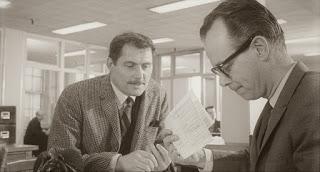 Long before The Empire Strikes Back, Irvin Kershner cut his teeth directing The Luck of Ginger Coffey (1964). This downbeat Canadian drama covers familiar territory, depicting a naïve immigrant out of his depth.
Long before The Empire Strikes Back, Irvin Kershner cut his teeth directing The Luck of Ginger Coffey (1964). This downbeat Canadian drama covers familiar territory, depicting a naïve immigrant out of his depth.Irishman Ginger Coffey (Robert Shaw) struggles to adapt to life in Montreal. He works a menial proofreader's job while squandering money on beer, alienating his wife Vera (Mary Ure) and daughter Paulie (Libbie McClintock). When Vera leaves him for coworker Joe McGlade (Tom Harvey), Ginger tries to reform himself, asking his boss (Liam Redmond) for promotion and taking on a second job. Eventually though, Ginger's excesses take their toll.
Based on Brian Moore's novel, The Luck of Ginger Coffey plays like a British kitchen sink drama transplanted to Montreal. Ginger is both working class and an immigrant, finding Canadian society a rough fit. Kershner and Moore capture interesting social nuances, from economic recession to prejudice towards French-Canadians. MacGregor hires Ginger on a non-union contract and he's resented as a foreigner taking native jobs. This gives Coffey's despair a sharp edge.
And Ginger does little to alleviate it. He lies to Vera about his prospects, finding employers don't care about his Irish credentials. Here he resembles Willy Loman more than Jimmy Porter, sustaining himself through empty optimism and false promises. Ultimately he plays his hand too forcefully against MacGregor, leading to a drunken episode that shatters his opportunities.
Robert Shaw brilliantly captures Ginger's boisterous despair. Shaw's salty, swaggering charm alternates with pathetic pleading, a well-rounded character. Mary Ure's (then Mrs. Shaw) resentful provides counterpoint. The Canadian cast provide workmanlike turns, with Tom Harey's traitorous friend and Tom Kneebone's chatty drunk faring best.
The Luck of Ginger Coffey avoids outright tragedy with an ambiguously hopeful ending. Nonetheless, its low-key despair is palpable, making for an engaging drama.

